Conceptual metaphor a family is a house in Vietnamese
The article analyzes the conceptual metaphor A FAMILY IS A HOUSE in Vietnamese to explore the ways Vietnamese people conceptualize family via the domain of HOUSE. To fulfill the research objectives, the article uses the theory of conceptual metaphors and other fundamental concepts of Cognitive linguistics to establish and analyze the mappings from the source domain HOUSE to the target domain FAMILY. The research findings show that Vietnamese people use the house to conceptualize the family as a place to shelter and protect each member. Besides, different parts of the house including the roof, rooftop, pillar, space and the activities of building, destroying the house are also used to express the ways Vietnamese people perceive the roles of the father, husband, family relationships, establishment and breakup and protection of the family. The use of the house to express views of the family demonstrates distinctive cultural features of the Vietnamese people
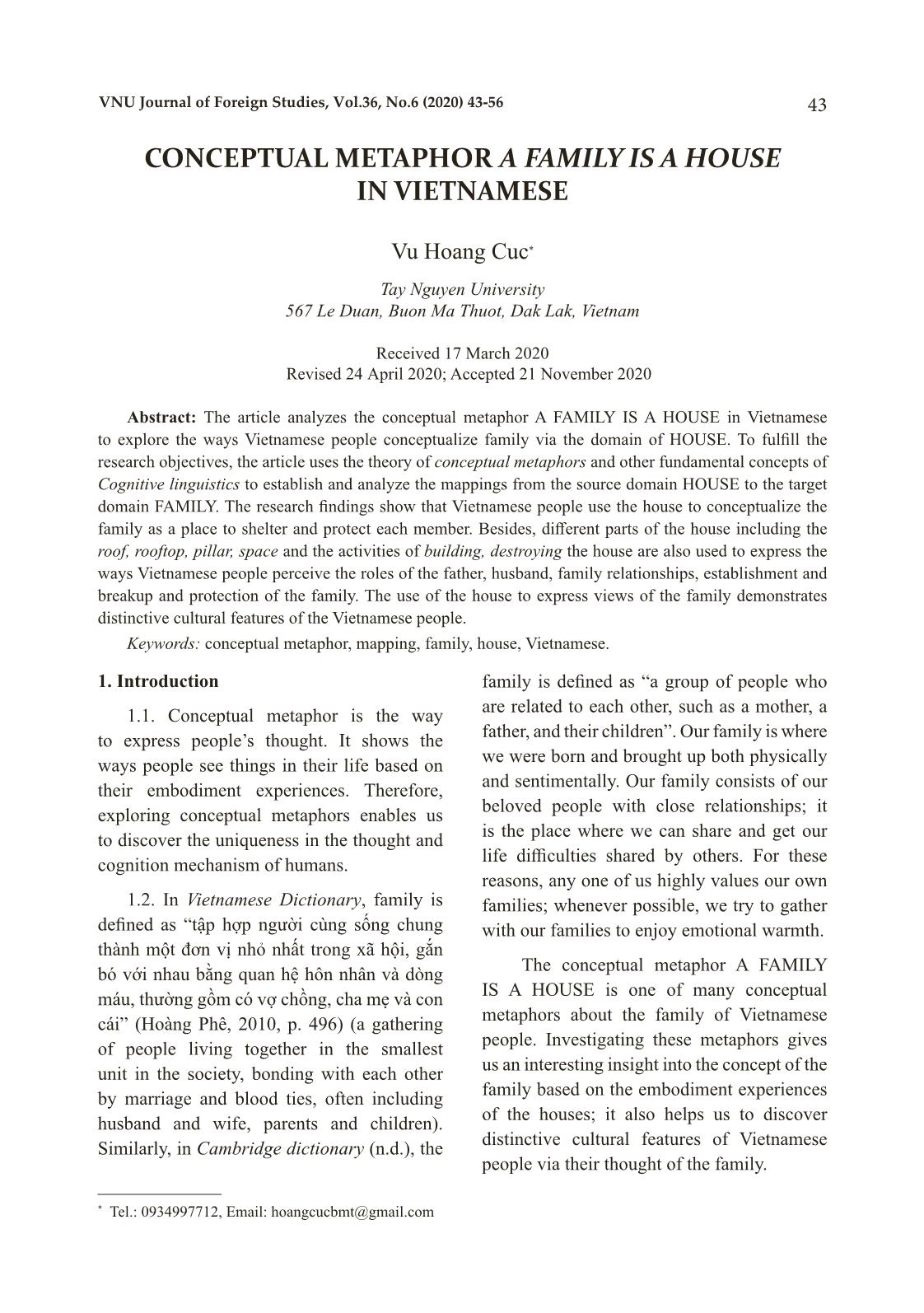
Trang 1
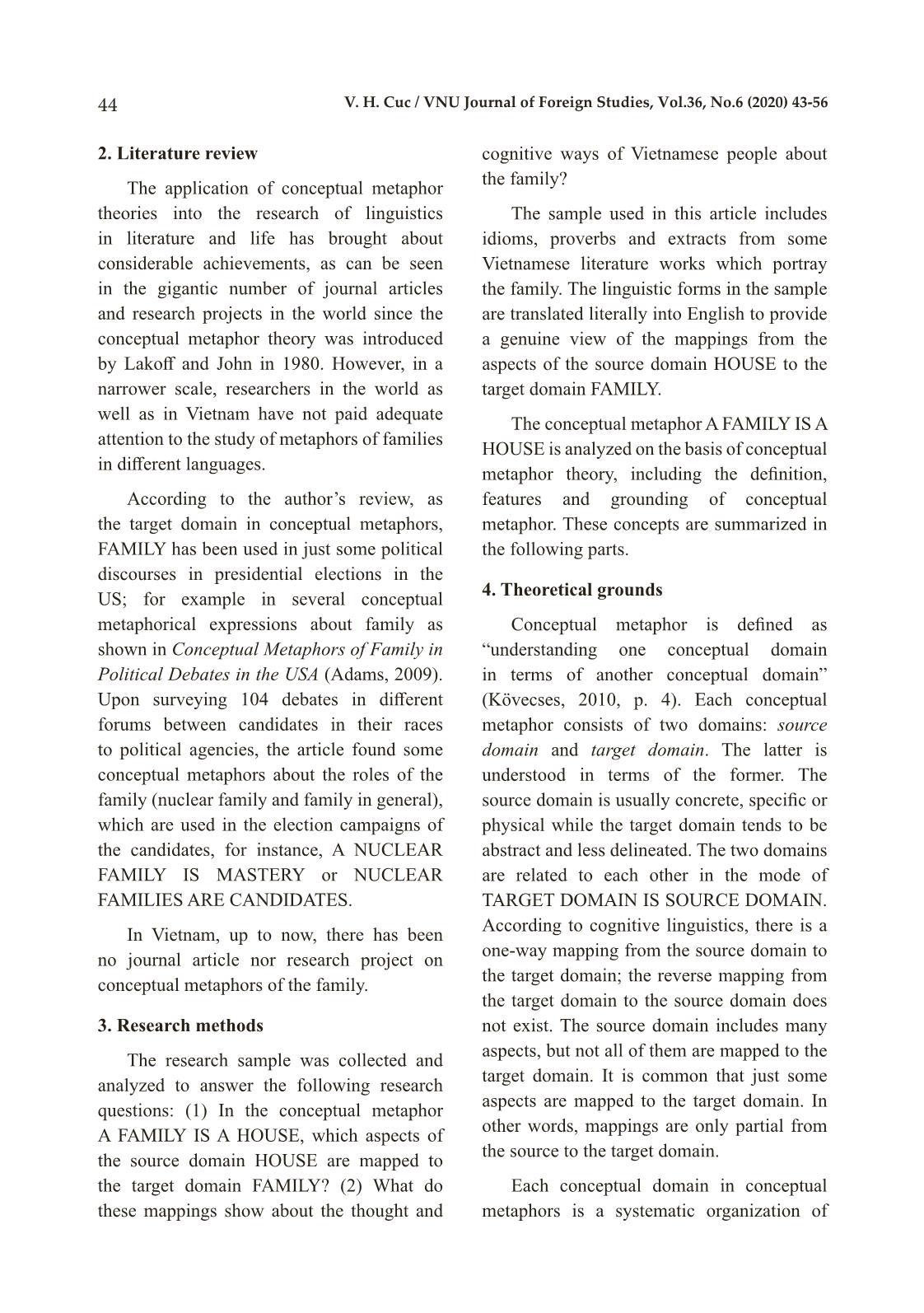
Trang 2
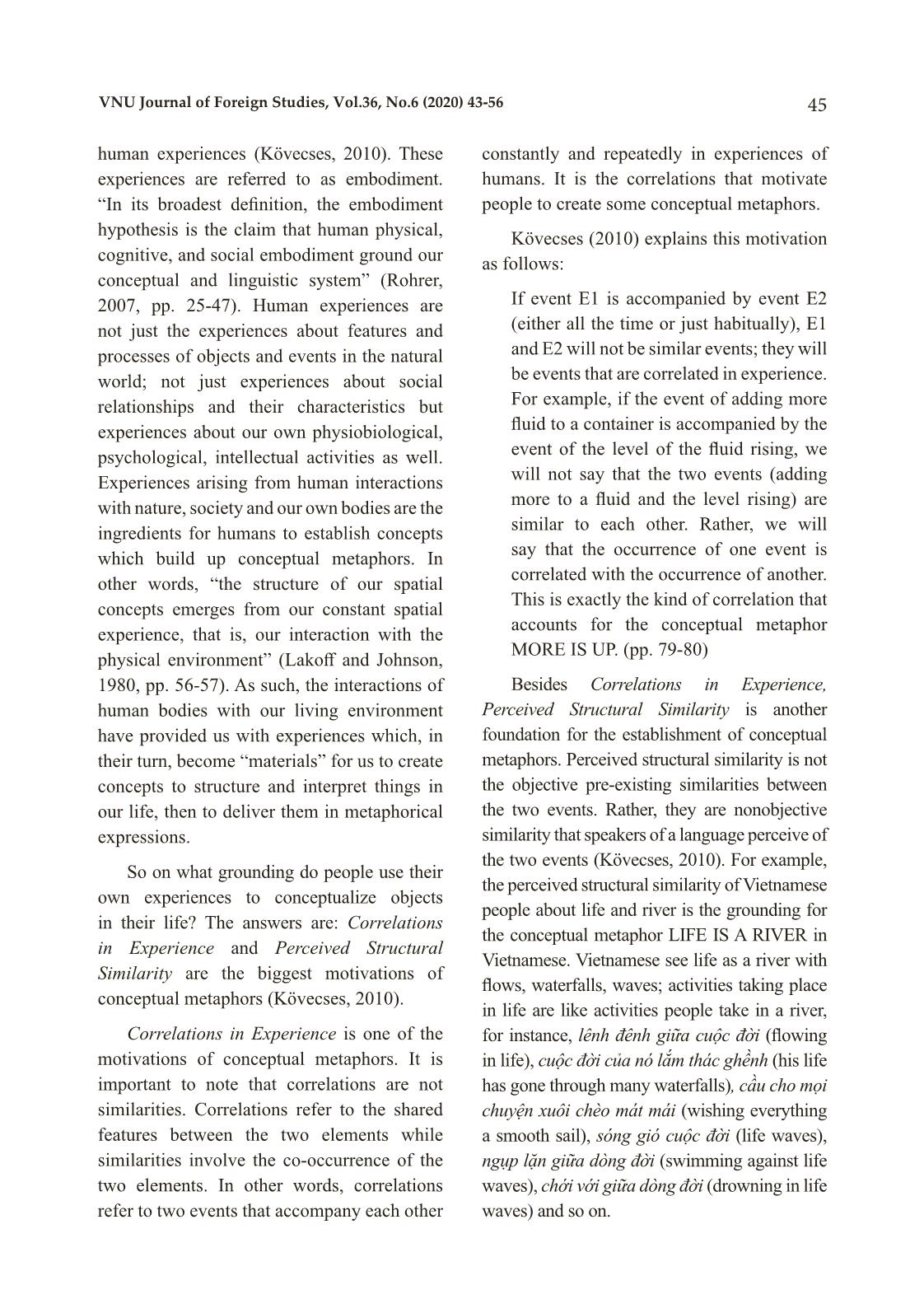
Trang 3
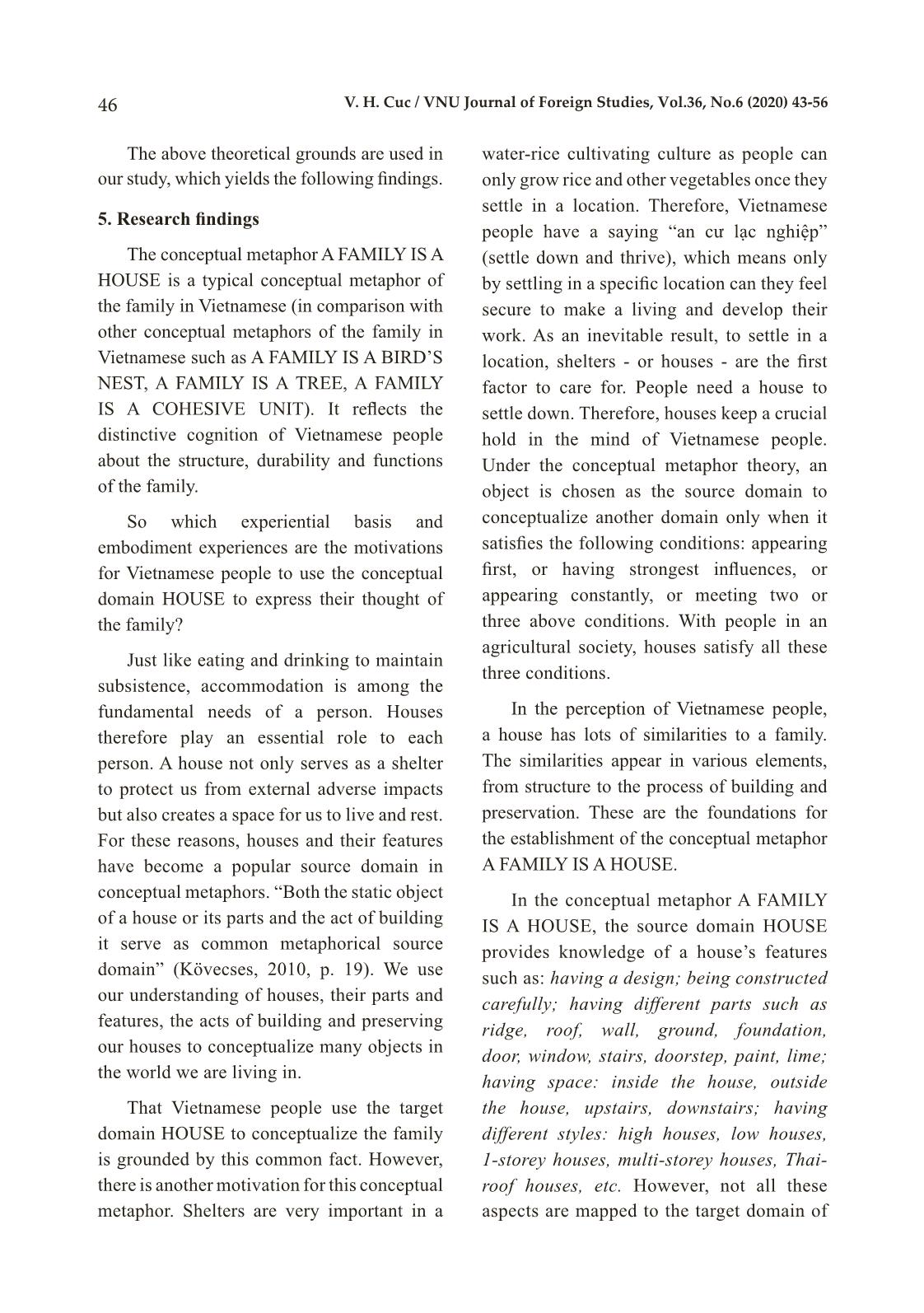
Trang 4
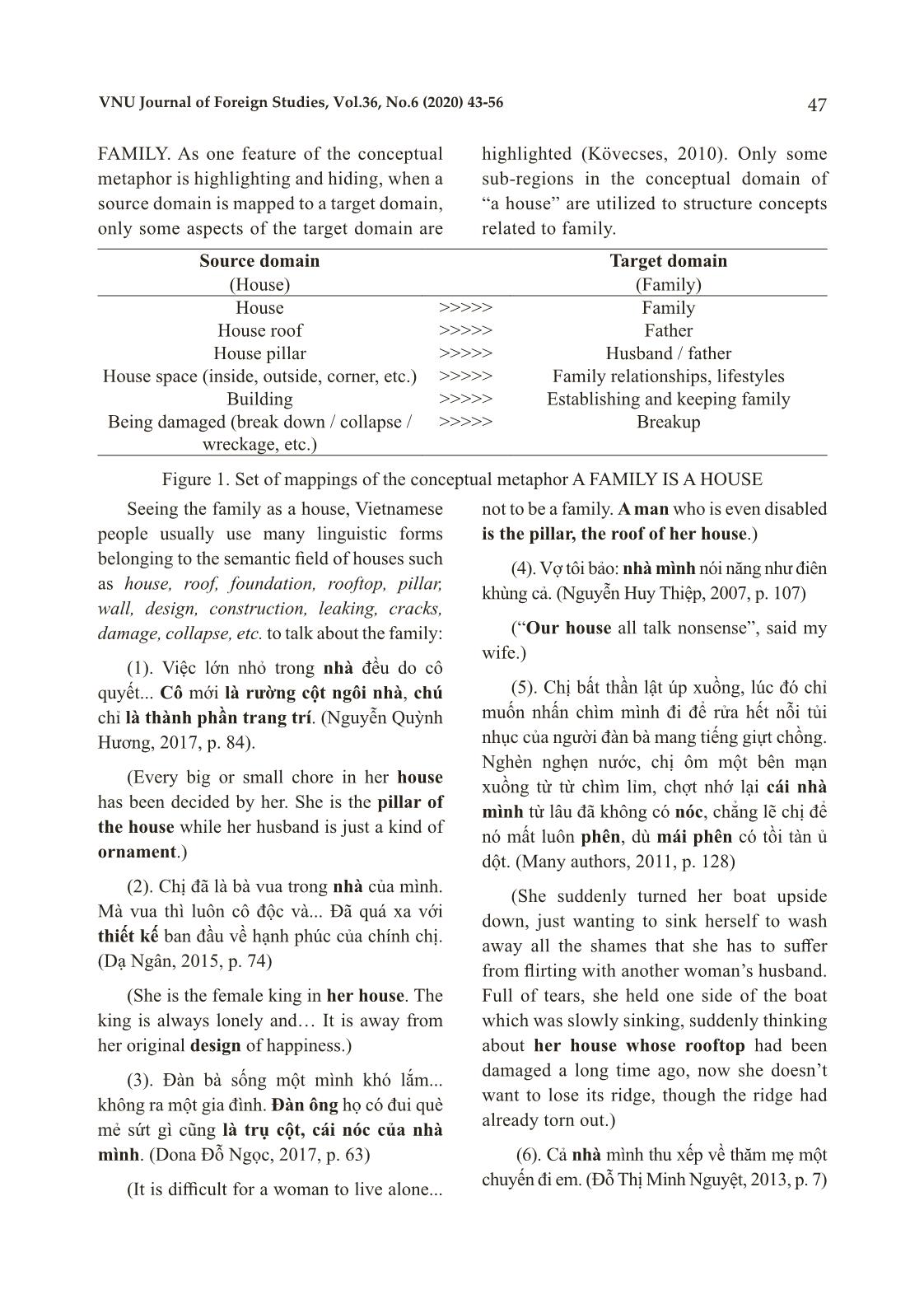
Trang 5
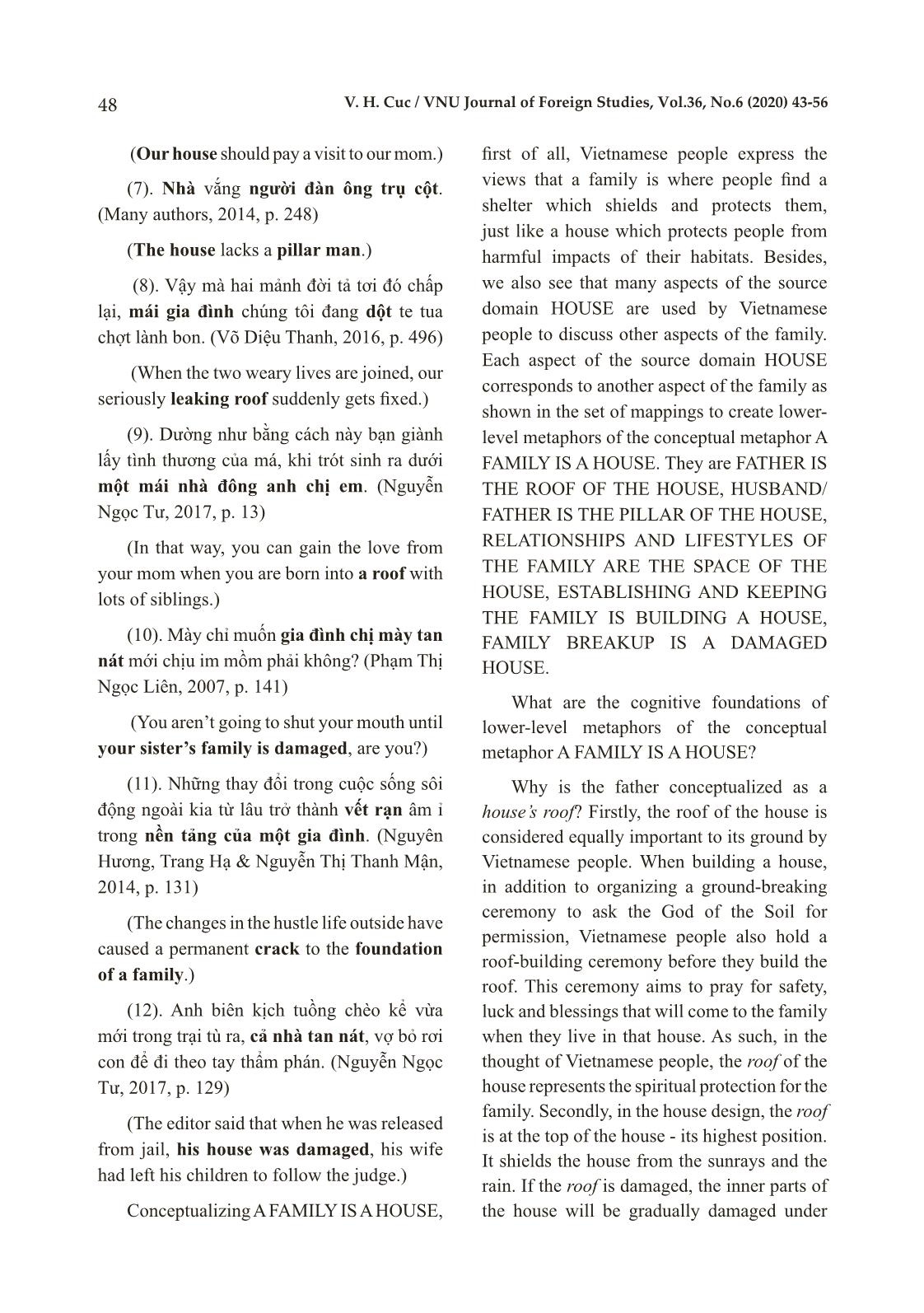
Trang 6
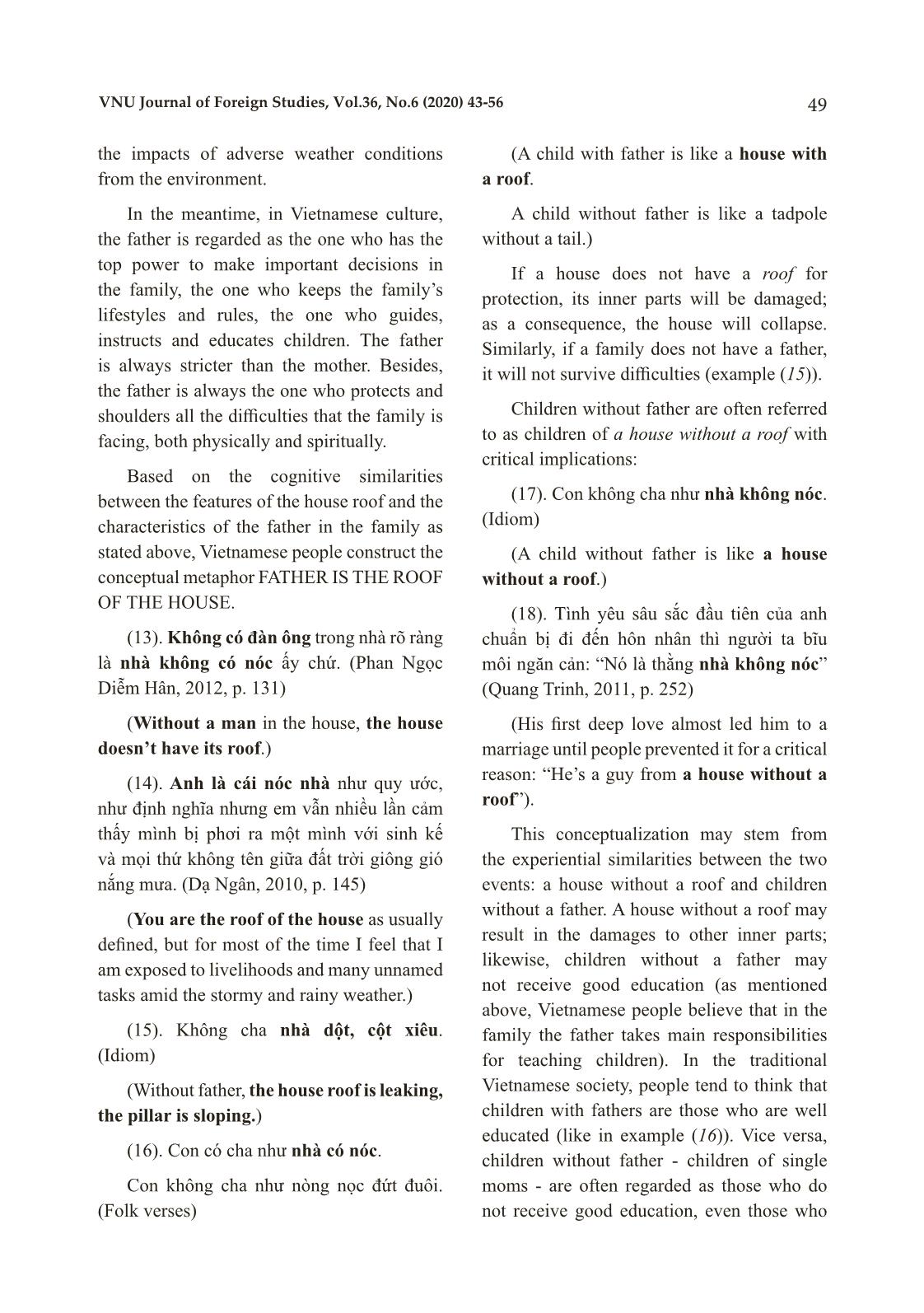
Trang 7
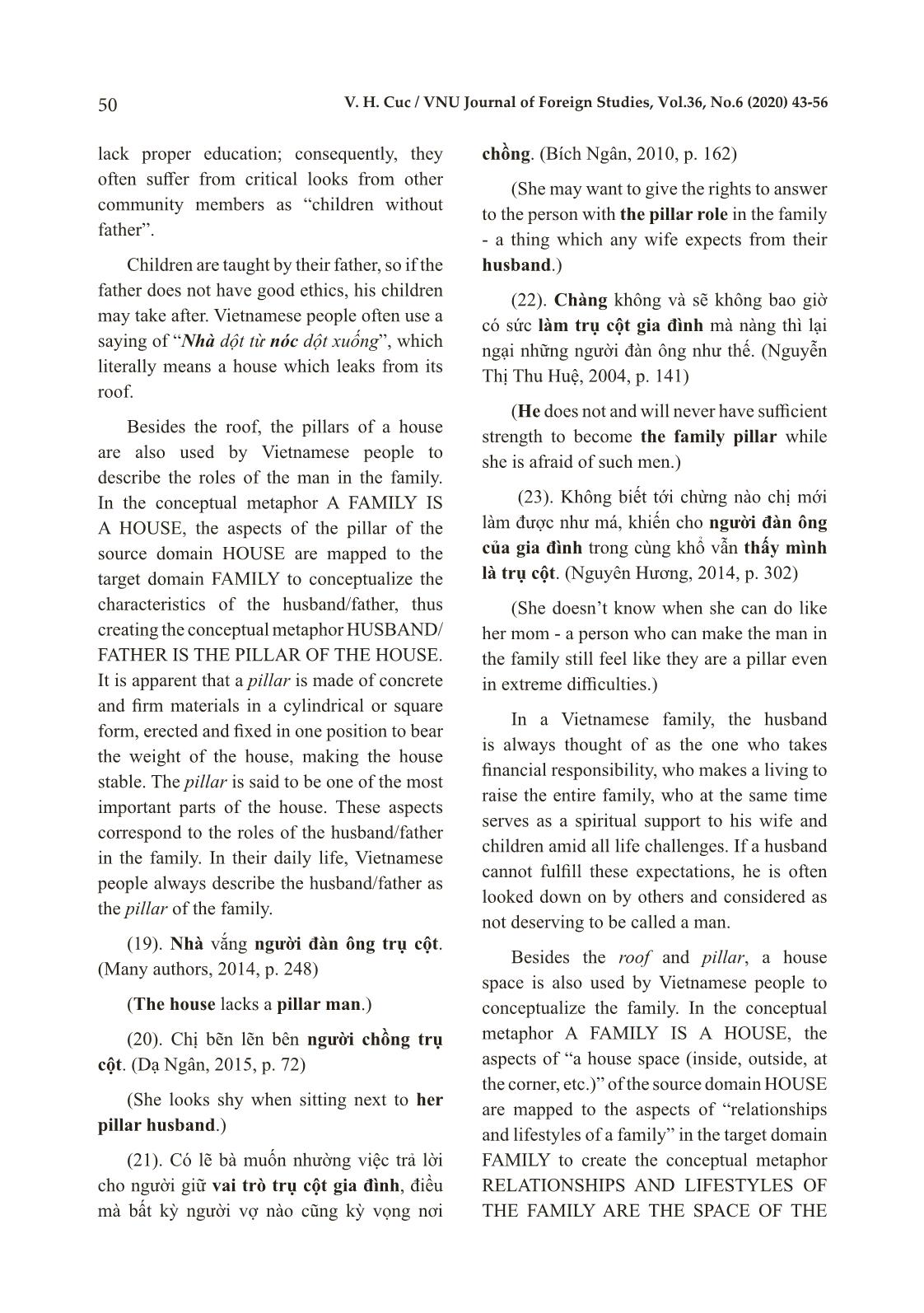
Trang 8
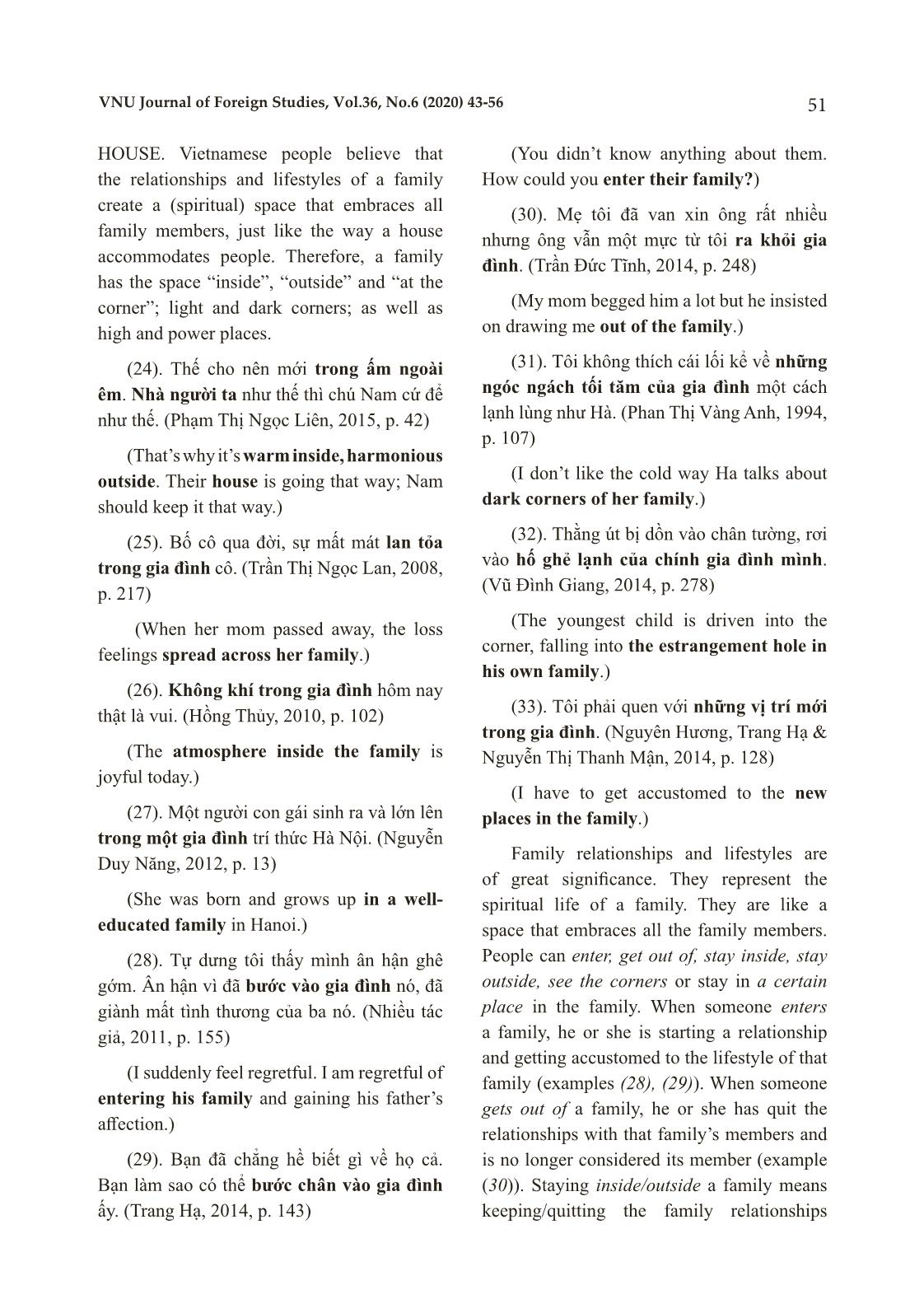
Trang 9
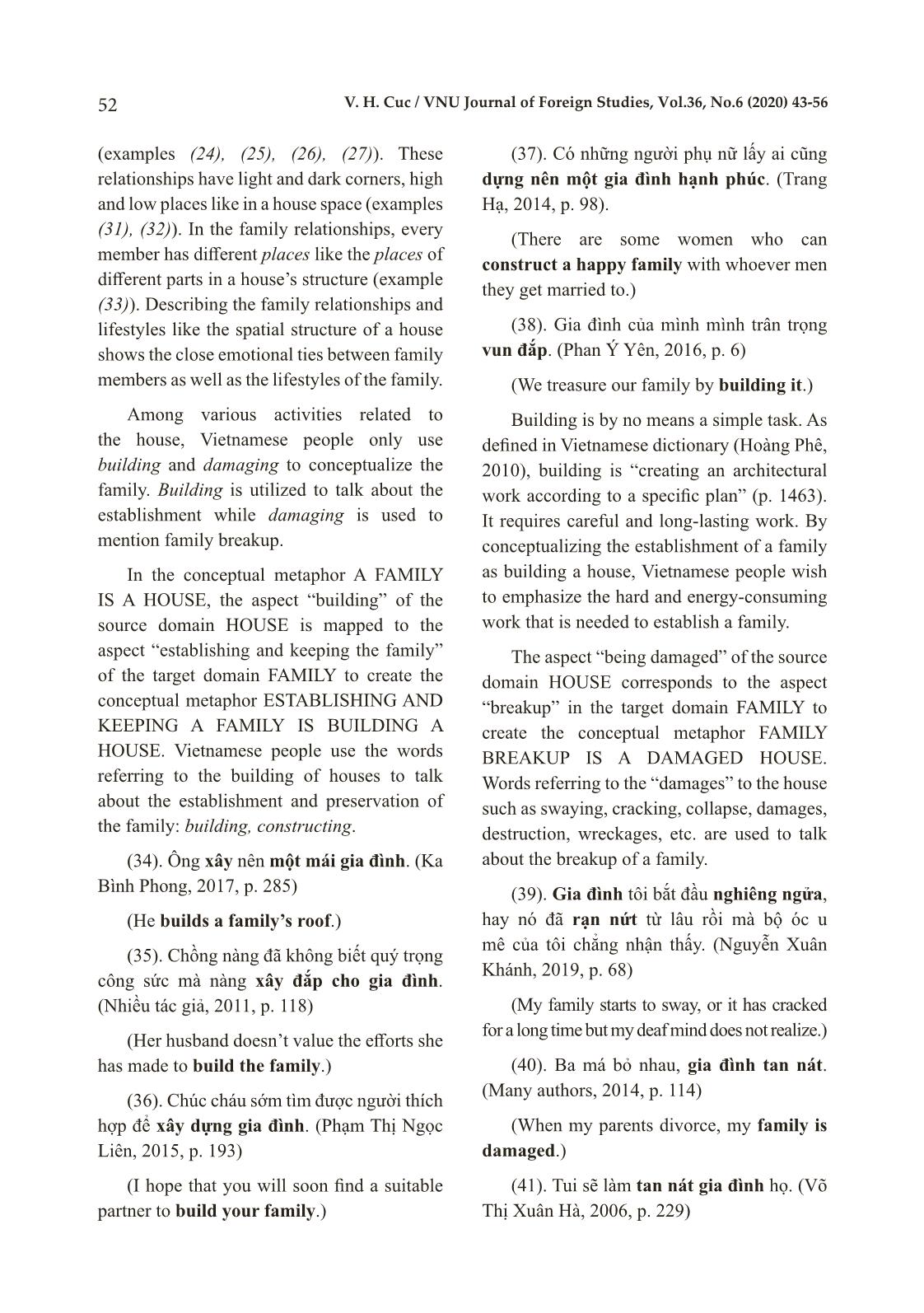
Trang 10
Tải về để xem bản đầy đủ
Tóm tắt nội dung tài liệu: Conceptual metaphor a family is a house in Vietnamese
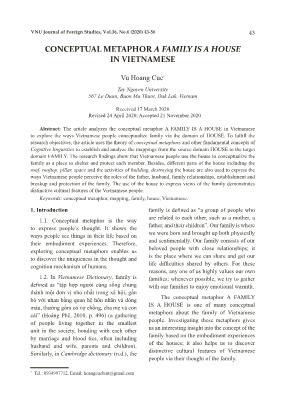
ces like the places of different parts in a house’s structure (example (33)). Describing the family relationships and lifestyles like the spatial structure of a house shows the close emotional ties between family members as well as the lifestyles of the family. Among various activities related to the house, Vietnamese people only use building and damaging to conceptualize the family. Building is utilized to talk about the establishment while damaging is used to mention family breakup. In the conceptual metaphor A FAMILY IS A HOUSE, the aspect “building” of the source domain HOUSE is mapped to the aspect “establishing and keeping the family” of the target domain FAMILY to create the conceptual metaphor ESTABLISHING AND KEEPING A FAMILY IS BUILDING A HOUSE. Vietnamese people use the words referring to the building of houses to talk about the establishment and preservation of the family: building, constructing. (34). Ông xây nên một mái gia đình. (Ka Bình Phong, 2017, p. 285) (He builds a family’s roof.) (35). Chồng nàng đã không biết quý trọng công sức mà nàng xây đắp cho gia đình. (Nhiều tác giả, 2011, p. 118) (Her husband doesn’t value the efforts she has made to build the family.) (36). Chúc cháu sớm tìm được người thích hợp để xây dựng gia đình. (Phạm Thị Ngọc Liên, 2015, p. 193) (I hope that you will soon find a suitable partner to build your family.) (37). Có những người phụ nữ lấy ai cũng dựng nên một gia đình hạnh phúc. (Trang Hạ, 2014, p. 98). (There are some women who can construct a happy family with whoever men they get married to.) (38). Gia đình của mình mình trân trọng vun đắp. (Phan Ý Yên, 2016, p. 6) (We treasure our family by building it.) Building is by no means a simple task. As defined in Vietnamese dictionary (Hoàng Phê, 2010), building is “creating an architectural work according to a specific plan” (p. 1463). It requires careful and long-lasting work. By conceptualizing the establishment of a family as building a house, Vietnamese people wish to emphasize the hard and energy-consuming work that is needed to establish a family. The aspect “being damaged” of the source domain HOUSE corresponds to the aspect “breakup” in the target domain FAMILY to create the conceptual metaphor FAMILY BREAKUP IS A DAMAGED HOUSE. Words referring to the “damages” to the house such as swaying, cracking, collapse, damages, destruction, wreckages, etc. are used to talk about the breakup of a family. (39). Gia đình tôi bắt đầu nghiêng ngửa, hay nó đã rạn nứt từ lâu rồi mà bộ óc u mê của tôi chẳng nhận thấy. (Nguyễn Xuân Khánh, 2019, p. 68) (My family starts to sway, or it has cracked for a long time but my deaf mind does not realize.) (40). Ba má bỏ nhau, gia đình tan nát. (Many authors, 2014, p. 114) (When my parents divorce, my family is damaged.) (41). Tui sẽ làm tan nát gia đình họ. (Võ Thị Xuân Hà, 2006, p. 229) 53VNU Journal of Foreign Studies, Vol.36, No.6 (2020) 43-56 (I will destroy their family.) (42). Một tình bạn phản bội, một gia đình đổ nát... đều là bất hạnh cá nhân. (Phan Ý Yên, 2016, p. 13) (A friendship betrayal, a family destruction all are personal mishaps.) (43). Anh cũng yêu em nhưng anh không thể phá vỡ cuộc sống gia đình được. (Nguyễn Thị Thu Huệ, 2004, p. 484) (I love you too but I cannot destroy my family life.) (44). Tại sao gia đình đang tốt đẹp như thế, đang đầm ấm như thế mà ba nỡ phá hỏng? (Phạm Thị Ngọc Liên, 2007, p. 31) (Why can you destroy a family which is so beautiful and cozy, dad?) (45). Lý do gì đã dẫn đến sự đổ vỡ của gia đình cô? (Từ Thiết Linh, 2004, p. 9) (What caused her family’s collapse?) (46). Sự tan vỡ của gia đình đã làm bà suy nhược thần kinh. (Many authors, 2014, p. 122) (Her family’s collapse has resulted in her neurasthenia?) A house is a solid object with many parts, when it is damaged, there will be a massive collapse, its parts will fall apart and be destroyed. The force that causes the damages to the house must be immensely strong. Therefore, the expressions the family collapses / is damaged / is destroyed, etc. not only depict the breakup of the family but also show the spiritual injuries that family members have to suffer. When a family breaks up, its members are hurt, as each part the house is broken into pieces. At the same time, these linguistic expressions also imply that the causes of family breakup have put heavy pressure on each member, hurting them emotionally; moreover, when a family is destroyed, its builders must feel very sad and regretful because just like building a house, it takes a long time and lots of efforts to build up a family. Most importantly, the message that Vietnamese people want to convey when conceptualizing FAMILY BREAKUP IS A DAMAGED HOUSE is the affirmation about the roles of the family as a shelter to each member. Losing family is like losing a house, losing a shelter to each person. The collapse of a family due to marriage failure really has negative impacts on each member. Based on the metaphor A FAMILY IS A HOUSE, we can find the derivative metaphor A HAPPY FAMILY IS A WARM HOUSE. (47). Người ta sinh ra đâu ai chọn bố, chọn mẹ, chọn mái ấm hay mái rách cho mình được. (Võ Thu Hương, 2012, p. 159) (A person cannot choose his father, mother, warm house or cold house for himself.) (48). Mỹ đã coi đây là mái ấm gia đình. (Hồng Thủy, 2010, p. 96) (Mỹ has considered this place her warm house.) (49). Anh từng hứa cho chị mái ấm nhưng đến cả mái nhà còn lo chưa xong. (Thái Cường, 2018, p. 36) (He promised to bring her a warm house but now cannot even create a roof.) (50). Em hỏi anh, anh định kéo dài quan hệ giữa em và anh đến bao giờ? Người đàn ông nhún vai: điều này em tự biết. Cô bảo: Em cần một mái ấm. (Võ Thị Xuân Hà, 2009, p. 6) (“Tell me, you plan to maintain our relationship for how long?” The man shakes his shoulder: “You know it by yourself.” She answers: “I need a warm roof”.) 54 V. H. Cuc / VNU Journal of Foreign Studies, Vol.36, No.6 (2020) 43-56 The conceptual metaphor A HAPPY FAMILY IS A WARM HOUSE is a complex metaphor with the presence of metonymy. It has the combination of the conceptual metonymy THE HOUSE ROOF IS A HOUSE (where part stands for the whole) and the conceptual metaphor HAPPINESS IS WARMTH. In its turn, HAPPINESS IS WARMTH is the lower- level metaphor of the conceptual metaphor POSITIVE EMOTIONS ARE WARMTH. The conceptual metaphor POSITIVE EMOTIONS ARE WARM TEMPERATURES stems from people’s physiologic embodiment about warm temperatures. Warmth is different from heat. Heat may be unbearable while warmth brings us comfort and relaxation. Food will taste better when it is kept warm, a warm hand will make holders feel intimate and peaceful, a warm house will help us stay healthy, etc. From experiences of the impacts that warm temperatures place on our bodies, we usually use warm feelings to describe things that bring us comfort: Ăn vào thấy ấm bụng (feel warmer after eating), nghe ấm trong dạ (feel warm in our soul), nghe ấm lòng (feel warm in our heart), cuộc sống ấm no (a warm full life), cuộc sống ấm êm (a warm life), no cơm ấm cật (full stomach, warm feeling), etc. Among different emotions of humans, love, like, affection, happiness, delight, enjoyment, etc. are those which bring comfortable feelings to recipients. It is similar to the feelings that warm temperatures bring to us. These similarities motivate the conceptual metaphor POSITIVE EMOTIONS ARE WARM TEMPERATURES. Vietnamese people have common saying: sự ấm áp của tình người (the warmth of human’s ties); những tình cảm ấm nồng (warm sentiments); tình cảm của họ đang ấm dần lên (their emotions are warming up); sự quan tâm khiến người ta ấm lòng (cares that warm people’s hearts), etc. By conceptualizing A HAPPY FAMILY IS A WARM HOUSE, Vietnamese people express the view that family is their beloved shelter, a place where people feel safe and can come back to feel comfortable, sentimental and loved. 6. Conclusion In summary, based on the similar feelings of a house and a family, Vietnamese people use the cognition and experiences that are formed by their experiences of their houses to describe their family via the conceptual metaphor A FAMILY IS A HOUSE. Some aspects of the house, including the roof, pillar, space, building, being damaged, are mapped to family members, relationships, the establishment and breakup of the family to create lower-level metaphors of the conceptual metaphor A FAMILY IS A HOUSE, including: FATHER IS THE ROOF OF THE HOUSE, HUSBAND/ FATHER IS THE PILLAR OF THE HOUSE, RELATIONSHIPS AND LIFESTYLES OF THE FAMILY ARE THE SPACE OF THE HOUSE, ESTABLISHING AND KEEPING A FAMILY IS BUILDING A HOUSE, FAMILY BREAKUP IS A DAMAGED HOUSE. Besides, the house roof is also used to conceptualize family in the metaphor A HAPPY FAMILY IS A WARM HOUSE - a complex metaphor created by the combination of the conceptual metonymy THE HOUSE ROOF IS A HOUSE and the conceptual metaphor HAPPINESS IS WARMTH. The conceptual metaphor A FAMILY IS A HOUSE and its lower-level metaphors, derivative metaphors demonstrate the distinctive conceptualization of Vietnamese people about the family: A family is a place that shelters and protects people; a family is built up via a hard and time- consuming process; family breakup causes lots of injuries to its members; in a family, the father holds the top position who leads the family and educates children; the father/husband is considered the strongest person who provides physical and spiritual supports to his wife and 55VNU Journal of Foreign Studies, Vol.36, No.6 (2020) 43-56 children; the relationships and lifestyles are the space embracing all family members; a happy family is a shelter full of warmth and love. As such, the conceptual metaphor A FAMILY IS A HOUSE and its lower-level metaphors illustrate the cares of Vietnamese people of their family including its establishment, structures, durability and functions. REFERENCES Vietnamese Hoàng Phê (chủ biên). (2010). Từ điển tiếng Việt. Hà Nội: Nxb Từ điển bách khoa. English Adams, K. L. (2009). Conceptual Metaphors of Family in Political Debates in the USA. In K. Ahrens (Ed.), Politics, Gender and Conceptual Metaphors (pp. 184-206). London: Palgrave Macmillan. Kövecses, Z. (2010). Metaphor - A Practical Introduction (2nd ed.). New York: Oxford University Press. Lakoff, G. (1993). The Contemporary Theory of Metaphor. In A. Ortony (Ed.), Metaphor and Thought (2nd ed., pp. 202-251). Cambridge: Cambridge University Press. Lakoff, G. & Johnson, M. (1980). Metaphors we live by. London: The University of Chicago Press. Rohrer, T. (2007). Embodiment and Experientialism. In D. Geeraerts and H. Cuyckens (Eds.), The Oxford Handbook of Cognitive Linguistics (pp. 25-47). New York: The University of Oxford Press. Family. (n.d.). In Cambridge Dictionary. Retrieved from https://dictionary.cambridge.org/vi/dictionary/ english/family Survey data Phan Thị Vàng Anh (1994). Khi người ta trẻ. Hà Nội: Nxb Hội Nhà văn. Thái Cường (2018). Gam lam không thực. Tp HCM: Nxb Tổng hợp. Vũ Đình Giang (2014). Nết đất. Tp HCM: Nxb Trẻ. Trang Hạ (2014). Tình nhân không bao giờ đòi cưới (Tái bản lần thứ 7). Hà Nội: Nxb Phụ nữ. Võ Thị Xuân Hà (2006). Chuyện của con gái người hát rong. Hà Nội: Nxb Hội Nhà văn. Võ Thị Xuân Hà (2009). Thế giới tối đen. Hà Nội: Nxb Hội Nhà văn. Phan Ngọc Diễm Hân (2012). Dấu xăm cánh bướm. Tp Hồ Chí Minh: Nxb Trẻ. Nguyễn Thị Thu Huệ (2004). 37 Truyện ngắn Nguyễn Thị Thu Huệ. Hà Nội: Nxb Hội Nhà văn. Nguyên Hương (2014). 1989.vn. Tp HCM: Nxb Trẻ. Nguyên Hương, Trang Hạ & Nguyễn Thị Thanh Mận (2014). Món quà đến sau những cơn mưa. Tp HCM: Nxb Trẻ. Nguyễn Quỳnh Hương (2017). Trái tim đàn bà. Hà Nội: Nxb Phụ nữ. Võ Thu Hương (2012). Đó là tình yêu. Tp HCM: Nxb Trẻ. Nguyễn Xuân Khánh (2019). Chuyện ngõ nghèo. Hà Nội: Nxb Hội Nhà văn. Trần Thị Ngọc Lan (2008). Mẹ trần gian. Hà Nội: Nxb Hội Nhà văn. Từ Thiết Linh (2004). Miền quê trăn trở. Hà Nội: Nxb Hội Nhà văn. Phạm Thị Ngọc Liên (2007). Người đàn bà bí ẩn. Tp HCM: Nxb Trẻ. Phạm Thị Ngọc Liên (2015). Và tháng ngày trôi đi. Tp HCM: Nxb Trẻ. Nguyễn Duy Năng (2012). Tản mạn từ quê ra tỉnh. Tp Vinh: Nxb Đại học Vinh. Bích Ngân (2010). Thế giới xô lệch. Hà Nội: Nxb Hội Nhà văn. Dạ Ngân (2010). Gánh đàn bà. Tp HCM: Nxb Thanh niên. Dạ Ngân (2015). Hoa ở trong lòng. Hà Nội: Nxb Phụ nữ. Dona Đỗ Ngọc (2017). ADN tình yêu. Hà Nội: Nxb Phụ nữ. Đỗ Thị Minh Nguyệt (2013). Bữa tiệc trần gian. Hà Nội: Nxb Hội Nhà văn. Nhiều tác giả (2011). Truyện ngắn hay và đoạt giải báo Phụ nữ 2009 - Trả duyên. Hà Nội: Nxb Phụ nữ. Nhiều tác giả (2014). Ảo ảnh xanh xưa. Tp HCM: Nxb Trẻ. Ka Bình Phong (2017). Bữa đời lạc phận. Tp HCM: Nxb Trẻ. Võ Diệu Thanh (2016). Qua mùa mặc nưa. Trong Tuyển tập truyện ngắn hay văn nghệ quân đội 2000-2016. Tp HCM: Nxb Trẻ. Nguyễn Huy Thiệp (2007). Truyện ngắn Nguyễn Huy Thiệp. Sài Gòn: Nxb Văn hóa. Hồng Thủy (2010). Mây trôi về phía cuối trời. Tp HCM: Nxb Trẻ. Trần Đức Tĩnh (2014). Đối cực. Tp HCM: Nxb Trẻ. Nguyễn Ngọc Tư (2017). Đong tấm lòng. Tp HCM: Nxb Trẻ. Quang Trinh (tuyển chọn) (2011). Truyện ngắn đặc sắc 2011. Hà Nội: Nxb Thời đại. Phan Ý Yên (2016). Không xinh, không thông minh, không bất bình thế giới. Hà Nội: Nxb Văn hóa Nghệ thuật. 56 V. H. Cuc / VNU Journal of Foreign Studies, Vol.36, No.6 (2020) 43-56 ẨN DỤ Ý NIỆM GIA ĐÌNH LÀ NGÔI NHÀ TRONG TIẾNG VIỆT Vũ Hoàng Cúc Đại học Tây Nguyên, 567 Lê Duẩn, Buôn Ma Thuột, Đắk Lắk, Việt Nam Tóm tắt: Bài viết phân tích ẩn dụ ý niệm GIA ĐÌNH LÀ NGÔI NHÀ trong tiếng Việt nhằm tìm hiểu cách tri nhận của người Việt Nam về gia đình thông qua miền ý niệm NGÔI NHÀ. Để tiến hành việc nghiên cứu, bài viết sử dụng lý thuyết ẩn dụ ý niệm và các khái niệm cơ bản khác của Ngôn ngữ học tri nhận để xác lập và phân tích sự ánh xạ từ miền nguồn NGÔI NHÀ đến miền đích GIA ĐÌNH. Kết quả nghiên cứu cho thấy rằng, người Việt Nam đã dùng ngôi nhà để khắc họa gia đình như là nơi che chở và bảo vệ mỗi thành viên. Bên cạnh đó, các bộ phận nóc nhà, mái nhà, trụ (cột), không gian và hoạt động xây dựng, phá hủy ngôi nhà cũng được dùng để biểu hiện cách tư duy, nhận thức về vai trò của người cha, người chồng, mối quan hệ trong gia đình, sự hình thành và ly tán, sự che chở của gia đình. Việc dùng ngôi nhà để bày tỏ quan niệm về gia đình thể hiện đặc trưng văn hóa rất độc đáo trong cách tư duy của người Việt Nam. Từ khóa: ẩn dụ ý niệm, ánh xạ, gia đình, ngôi nhà, tiếng Việt.
File đính kèm:
 conceptual_metaphor_a_family_is_a_house_in_vietnamese.pdf
conceptual_metaphor_a_family_is_a_house_in_vietnamese.pdf

